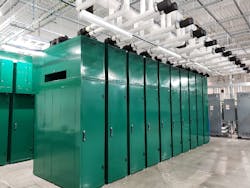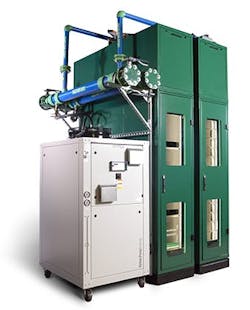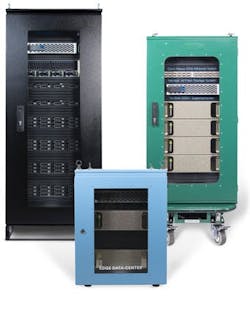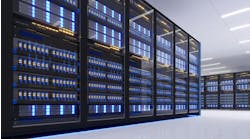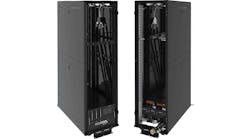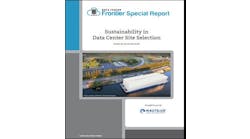TierPoint Investors Led By Cequel III Acquire High Density Cooling Specialist DDC Cabinet Technology
The spate of M&A and key partnerships in the arena of advanced cooling for artificial intelligence (AI) and cloud data centers continues. The investment backers of multi-tenant cloud and colocation operator TierPoint have now acquired a controlling interest in extreme density cooling specialist DDC Cabinet Technology.
DDC makes high-density cabinets and micro data centers. The DDC products are key components of infrastructure supporting AI computing. Following an initial investment last year, Cequel III on Jan. 31 announced that it, along with Thompson Street Capital Partners (TSCP), has taken a controlling interest in privately-held DDC.
Cequel III is a private investment firm based in St. Louis, Missouri with over $40 billion in successful transactions to its credit. The firm has been an investment partner for growth-oriented companies in sectors including real estate, healthcare, technology, and business services.
Also based in St. Louis, TSCP is a middle-market private equity firm who invests globally in the sectors for life sciences and healthcare, software and technology, and business and consumer services and products.
In 2020, global infrastructure funds led by Cequel III and TSCP invested $320 million in TierPoint, bolstering the position of the at-one-time regional data center provider known for rapidly building its national network through a series of 11 key acquisitions in just six years.
Financial details of the transaction to acquire a controlling interest in DDC Cabinet Technology were not disclosed.
“DDC Cabinet Technology offers truly exceptional, best-in-class cooling management solutions, and we’re seeing the demand for this equipment increase significantly with the rapid proliferation of AI and machine learning,” said Cequel III Chairman and CEO Jerry Kent.
Hogan Lovells US LLP acted as legal advisor to Cequel III and Kirkland & Ellis LLP as legal advisor to Thompson Street in the transaction. VLP Law Group LLP acted as legal advisor and DH Capital, a division of Citizens JMP Securities, LLC, acted as as financial advisor to DDC.
Cequel III's Kent added, “Our investor group is understandably excited about DDC’s prospects. The company is uniquely positioned to serve the data center operators, software developers, and cloud service providers that are powering the future of artificial intelligence.”
Former TierPoint Operations EVP Takes Hold at DDC
In the transaction, DDC co-founders Chris Orlando and Mark Ortenzi, who launched the DDC Cabinet business in 2011, will continue as minority investors in the company, according to a press release.
Orlando said, "This investment will enable us to expand the reach and scalability of DDC Technology, just as demand for these types of products explode.”
Meanwhile, following the transaction, Keith Markley became Chief Executive Officer of DDC Cabinet Technology, effective February 5. Markley is a 30-year veteran of the telecommunications and data center sectors, who previously served as Executive Vice President, Data Center Operations at TierPoint.
TierPoint has been a major DDC Cabinet Technology customer for providing secure, connected IT infrastructure to its thousands of data center clients.
Reporting to Markley, DDC co-founders Orlando and Ortenzi will lead the company's strategy and product innovation efforts, respectively, as the organization scales to meet the significant growth of high-density demands within the data center industry.
Hybrid Cooling Approach
DDC is a global specialist in the design and manufacture of innovative data center cabinet and cooling platforms for extreme density deployments. Among other uses, the patented DDC solutions furnish cooling options for high-density GPU and related computing clusters, required to run AI and similar compute-intensive applications.
The DDC products combine the efficiency of water-based heat-exchange with the flexibility and ease of deployment of traditional air cooling.
The company says its hybrid approach to cooling is optimized with proprietary software, the better to allow companies to rack high density IT servers and related equipment as they have traditionally done, while scaling up to 85 kW per cabinet, without the need for direct liquid cooling.
“DDC’s unique ability to surgically manage airflow volume and heat exchange makes it an ideal solution for data centers and end users alike,” explained DDC's Orlando. "It’s a rapidly deployable solution that addresses exponential increases in rack level density, while improving energy efficiency and overall hardware performance."
Flagship DDC Products
DDC's flagship data center cabinets, enclosures and cooling technology is being used in new builds, and to modernize existing facilities while increasing efficiency, and is also deployable at the edge in the form of micro data centers.
Employing DDC's patented liquid-air hybrid cooling technology, the company says its S-Series Cabinets are available in 40U, 45U, or 60U versions, combining the efficiency of liquid cooling with the flexibility of air-based cooling.
Featuring PUE as low as 1.15 and tsurgical airflow/CFM control up to 7,200 CFM, the company contends these enclosures can reduce the cost of new data center construction, can be added to an existing data center deployment, or can be installed as a standalone solution, "in any quantity, in almost any location."
Meanwhile, when proximity counts, DDC points out that its R-Series Enclosures are designed to take operators fully to the data center edge. With a variety of size and density configurations rangng from 12U, 24U, 30U and 42U, these ruggedized enclosures combine data center space, cooling, security, monitoring, and mobility capabilities in ready-to-deploy form factors.
Not to be confused with simple weatherproof IT cabinets, DDC notes that the R-Series systems operate up to 1.5 kW per rack unit, and include features such as vibration isolation, precision environmental control, positive-pressure systems, integrated security, fire suppression, and remote management and monitoring.

Matt Vincent
A B2B technology journalist and editor with more than two decades of experience, Matt Vincent is Editor in Chief of Data Center Frontier.
